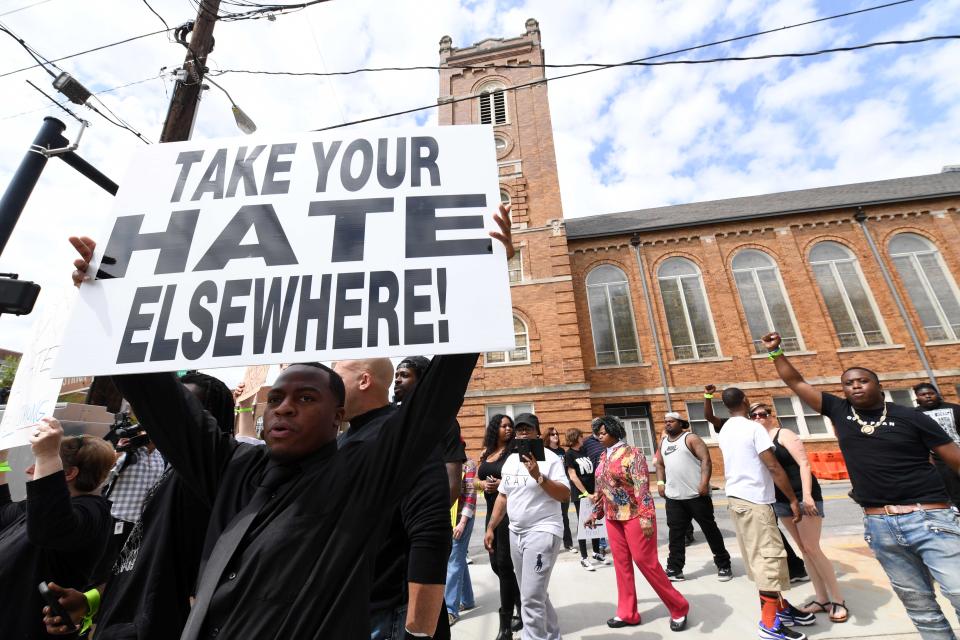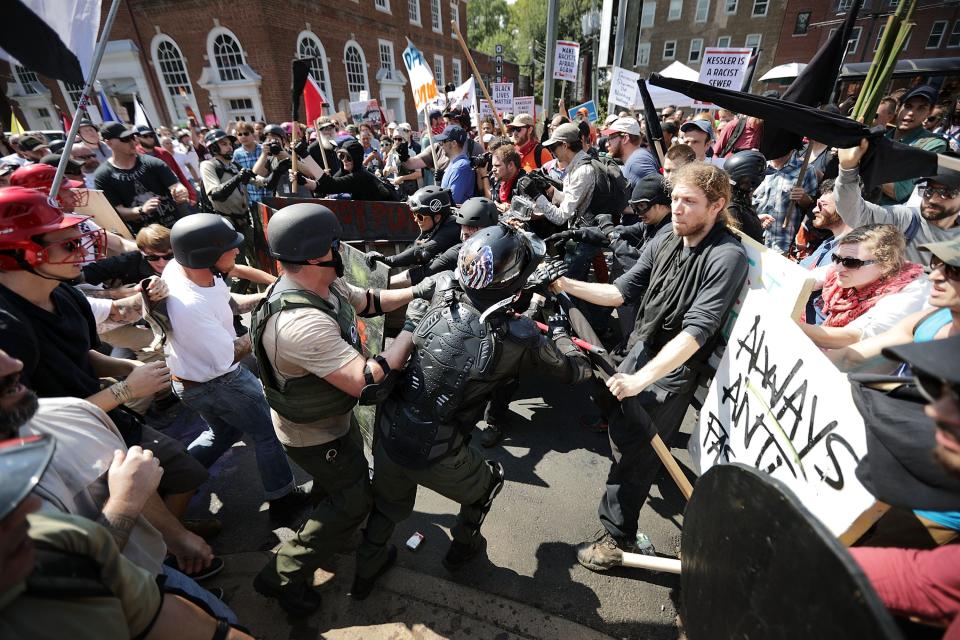'Alternate realities': Democrats and Republicans smear each other as 'fascists.' Is either right?
WASHINGTON – President Joe Biden infuriated Republicans when he preached the need for national unity at a Democratic fund-raiser and slammed right-wing, MAGA ideology as “semi-fascism.”
But Donald Trump went there first.
At a Minnesota campaign rally in the final weeks of the 2020 presidential election, which he would lose to Biden, Trump warned supporters that Democrats were plotting to replace American freedoms with "left-wing fascism."
“Fascists. They are fascists,” he declared.
In this era of uber-partisanship, Democrats and Republicans are frequently turning to the F-word – fascism – to smear their opponents and forecast a sinister future in which Americans could be stripped of the right to marry whomever they choose, reproductive choice could disappear, gun ownership could be outlawed and democratically held elections could be overturned.
Fears on the left and the right that fascism is on the rise in the United States come amid growing concern among Americans that democratic institutions – and democracy itself – are in peril heading into November’s midterm elections.
But politicians who label their adversaries as fascists “are thinking about fascism in a way that has nothing to do with what fascism might have actually been,” said Jonathan Zatlin, an associate professor of history at Boston University.
“When people are tossing around the word fascism,” Zatlin said, “the only thing people agree on is that fascism is a bad thing.”

'Threats to democracy'
Only about half of Americans have high confidence that votes in the upcoming elections will be counted accurately, according to a poll released last week by The Associated Press-NORC Center for Public Affairs Research.
The pessimism stems from the fallout of the 2020 presidential election, fueled by lies from Trump and his allies that Democrats stole the election. There is no evidence of widespread fraud or manipulation of voting machines during that election.
Voters in a separate NBC News poll released on Monday listed “threats to democracy” as the second-most important issue facing the country, right behind jobs and the economy.
What's more, 80% of Democrats and Republicans said the opposing political party poses a threat that, unless stopped, will destroy America as we know it.
At an Aug. 25 fund-raiser for the Democratic National Committee, Biden lamented to a crowd at a private residence in Bethesda, Maryland, that Americans have “sort of lost confidence that we can do anything.”
Democracy doesn’t work well unless you can reach a consensus, but you can’t reach consensus unless there is some unity, Biden said.
“What we’re seeing now is either the beginning or the death knell of an extreme MAGA philosophy,” he said. “It’s not just Trump. It’s the entire philosophy that underpins – it’s – I’m going say something: It’s almost like semi-fascism, the way in which it deals.”
Trump’s response was predictable.
“They banned a sitting president from social media, impeached him two times, jailed his supporters, and now raided his home,” he wrote on Truth Social, the media platform he helped launch after he was permanently banned from Twitter. “And then they go on TV and call us the fascists.”
Rep. Mo Brooks, R-Ala., argued on talk radio that Democrats are the real fascists.
“If you look at what fascism is,” Brooks said, “it’s more government dictatorial control. That’s Democrats’ policies and positions hand in glove. It’s Democrats who are the ones to tend to be more fascist because fascism is the opposite of liberty and freedom, and the Democrats don’t trust us to make our own decisions. They believe the government should be doing it.”
Equality and democracy 'under assault': 'MAGA forces' determined to 'take country backwards,' Biden says in speech from Philadelphia

What is fascism?
So who’s right? What is fascism anyway?
Historically, fascism is a far-right, authoritarian political ideology often associated with Italian dictator Benito Mussolini, who rose to power after World War I and coined the term in 1919 to describe his political movement.
Fascism involves a cultish, dictatorial leader who spreads lies and propaganda while promising national restoration in the face of supposed threats by leftist forces, such as liberals, feminists, immigrants and gays. Fascists believe the opposition must be suppressed and that individual interests must give way for the perceived good of the nation and race.
Ruth Ben-Ghiat, a historian and expert on authoritarianism and fascism, argues Biden’s use of “semi-fascism” to describe the MAGA movement is accurate.
“Really everything about Trump’s style – his leader cult, his use of propaganda, his advertisement of himself as lawless, like when he said during the campaign, ‘I could stand on Fifth Avenue and shoot someone,’ … there are without a doubt many things about Trump and the Trumpified MAGA GOP that we call fascism,” said Ben-Ghiat, a history professor at New York University.
In true fascism, there is no voting, the government tells people what to do, and those who don’t follow the government’s dictates face serious consequences, Ben-Ghiat said.
Elections are the bedrock of the American political system, so Biden’s use of the term “semi-fascism” would seem to be an appropriate way to describe Trump’s efforts to undermine the electoral process and deny election results in an attempt to stay in power, she said.
Jason Stanley, a philosophy professor at Yale University and the son of Holocaust survivors, finds it particularly alarming that many right-wing groups in the U.S. are promoting the “great replacement” theory – a racist conspiracy belief that a global cabal of elites is letting immigrants into the country to replace white Americans.
White supremacists pushed the theory at a violent “Unite the Right” rally in Charlottesville, Virginia, in 2017. More recently, some Republicans in Congress have espoused variations of that same theme.
“I’m watching the country I love normalize a conspiracy theory that was at the heart of actions that killed my whole family,” Stanley said. “To hear the great replacement theory being normalized is something horrific.”
Turning back the clock: Will fights over curriculum usher in new era of segregated schools?
Communism or fascism?
As for the Republican claim that it’s the Democrats who are fascists, Stanley calls that absurd.
“Joe Biden and the Democrats are operating within democratic politics, they are abiding by the results of elections,” he said. “… In the United States, there’s one party that’s promising not to respect the results of elections. I think that when the Republicans call Democrats fascists, they’re projecting.”
When Republicans accuse Democrats of fascism, “I think they’re very confused,” Zatlin said. “I think what they really mean is communism,” which is a more accurate label for authoritarianism on the left, he said.
Communism and fascism aren’t the same thing.
Communism is a system based on the belief of economic equality and the desire for a classless society. Fascism, in contrast, perpetuates strict class roles and often entails a combination of racism and violence against democratic institutions, such as Trump’s disparaging remarks about migrants crossing the southern border and the mob attack on U.S. Capitol on Jan. 6, 2021, Zatlin said.
Trump’s false claims that he won the 2020 election – and the fact that so many Americans eagerly embrace that lie – just adds to the chaos, Zatlin said.
“The country has gotten to a point where the crises and the polarization are so bad that you have alternate realities colliding with each other,” he said. “That’s why the Republicans can claim that the Democrats are fascists, and the Democrats can complain the Republicans are.”
Michael Collins covers the White House. Follow him on Twitter @mcollinsNEWS.
'Voting is too dumb': Roe is gone, student debt is piling up and young people are mad. But will they vote?

This article originally appeared on USA TODAY: Democrats, Republicans cast each other as 'fascists' ahead of midterms